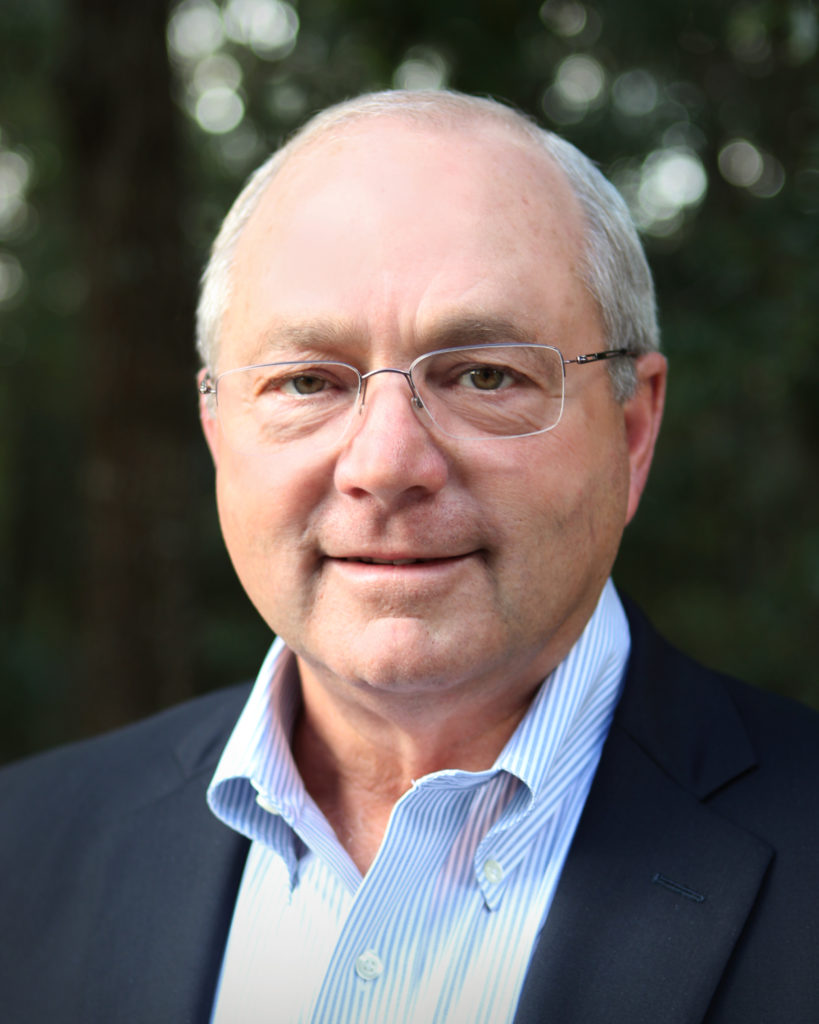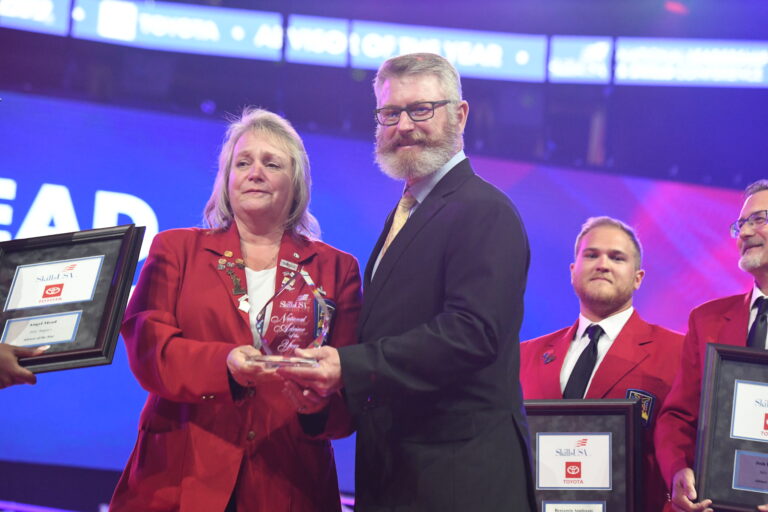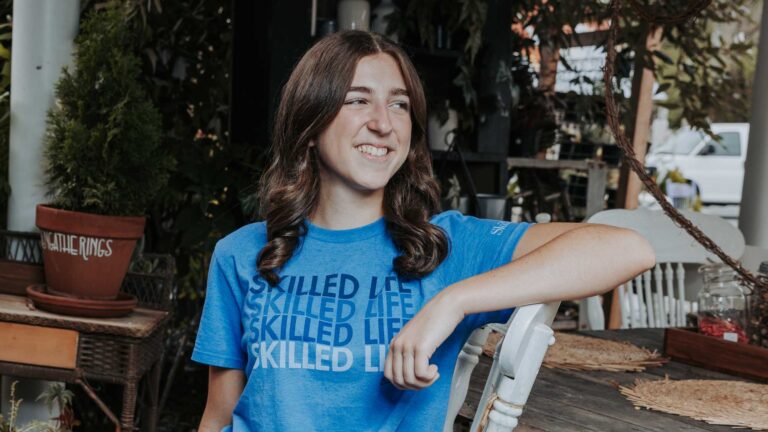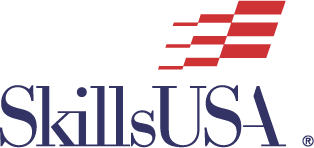Photos used with permission.
When it comes to that first experience with the world of work, some find their calling (or anti-calling), some learn valuable life lessons that can apply to any career, and others meet a mentor who makes a lifelong impact. Whether thoughts of your first work experience bring a smile to your face or make you cringe, all first jobs tend to be memorable and, inevitably, help shape our ultimate career goals. We asked several SkillsUSA stakeholders to share their first jobs with us, and their stories are as varied as their career paths.
Boyd Worsham

Floridian Boyd Worsham is the president and CEO of the National Center for Construction Education and Research (NCCER), an international education foundation serving the construction industry. He’s also a former SkillsUSA student member and has spent the last 10 years serving the SkillsUSA Championships as the technical committee chair for the Carpentry competition. As a boy, Worsham started his work life constructing bicycles and wagons for a local toy store during the Christmas season. Worsham shares, “I knew, even as a young person, that I wanted to be a builder.”
Worsham’s high school carpentry program in 11th and 12th grade solidified his desire to enter the industry. He was inspired by his instructor and SkillsUSA advisor, Hervey Robinson, who taught him employability skills, responsibility and a passion for the business of construction.
While in high school, Worsham worked summers as a carpenter helper for a friend’s grandfather who built entertainment facilities. For Worsham, it was a difficult-but-fun job, one that led to a life-changing epiphany: Being around big construction made Worsham realize that he not only wanted to work on big construction projects; he wanted to run them.
As Worsham was about to graduate, Robinson connected him to a position with The Haskell Company, a leader in design-build project delivery. Worsham spent the next 38 years at Haskell, rising from journeyman carpenter to carpenter foreman, assistant superintendent, superintendent and, finally, vice president of construction support. He also earned his Master of Business Administration degree while at Haskell, and while that’s a source of understandable pride, it doesn’t quite rise to the heights of inspiration Worsham still receives from those cherished hands-on skills. “Even though I have my MBA, I’m most proud about being a master carpenter, because those are the skills that enable me to build anything,” he says. “I know I can always feed my family because of that.”
In Nov. 2018, Worsham was named president and CEO of NCCER, an international education foundation serving the construction industry. Worsham feels that staying at NCCER for the rest of his career can truly make a difference for thousands of people by encouraging them to get into the construction industry and helping to make sure they are not only educated in their craft but able to obtain the tools to achieve the same kind of success Worsham experienced. Worsham says humbly, “If I could do it, I know many others can as well.”
His goal for the next chapter in his life? “To see the skills gap closed by leading young people to the many incredible career opportunities available in the construction industry.”
Lorrie Simon

SkillsUSA member and former high school officer Lorrie Simon has enjoyed a career path that evolved over time.
Starting as a hairdresser, Simon worked behind the chair for 10 years, eventually earning her instructor’s license. “I enjoyed being able to learn something new every day in a job that allowed me to use my creativity,” she explained. Following her experience in the field, Simon taught cosmetology for eight years at the Ogle School of Hair Design in Hurst, Texas, before briefly moving on to a job helping with salon inspections.
Now a consultant with the Burmax Company, Simon visits with schools and instructors to help support their cosmetology-related programs and events. Because Burmax is a supporter of SkillsUSA, Simon also attends and helps run SkillsUSA’s national Cosmetology, Barbering, Nail Care and Esthetics competitions. She also assists in judging SkillsUSA competitions at both the state and national levels and was recently elected president of the SkillsUSA Texas postsecondary board of directors.
Simon quickly lists the skills she thinks are needed to be a good worker in any career: active listening, teamwork, problem-solving, leadership, perseverance, motivation, the ability to work under pressure, time management, confidence and the skills of negotiation and persuasion.
As a 34-year industry veteran, Simon’s has some solid advice to anyone about to start a career: “Be true to yourself, listen and observe your surroundings. Find someone that you feel is on the path you are wanting to take and ask them if they would be your mentor. Also, remember that your career should fit with who you are, and it should feel comfortable for you.”
Riley Johnson

A former SkillsUSA North Carolina student member, a state and national SkillsUSA medalist and a 2017 WorldSkills competitor in Web Design and Development, Riley Johnson started his working career as a junior web developer for a company that provided an online database of bike routes and events. Granted an immediate degree of autonomy, he was able to make decisions about what technologies to use, what features should be added, and what changes needed to be made. “The autonomy was valuable to me in learning web development and prepared me for being able to work independently,” Johnson says.
Johnson later took a position with Lenovo, a computer manufacturing company. There, he performed web development for the hosted server division and, later, the data analytics department. Today, Johnson works for Kitware, a software research and development company. A member of the computer vision team, he develops computer vision and machine-learning software.
“I think the thing that helped me the most was being able to teach myself and quickly pick up on new technologies,” he says. “My advice to others is to make sure you’re working on something you like and that you’re passionate about. I think there’s a limit as to how successful someone can be if they don’t like what they are doing. And, never be afraid to look for new opportunities.”
Jessica Neri

A SkillsUSA Idaho alum, Jessica Neri earned both state and national medals in SkillsUSA’s Automotive Refinishing competition, a competition she currently serves on the national level as a technical committee co-chair. Neri is a commercial territory manager for PPG, a global supplier of paints and coatings. According to Neri, her high placement in the SkillsUSA Championships (bronze) helped her land that position.
Neri began her career by studying automotive refinishing in college, and she became an industrial painter right out of school. She admits she had a lot to learn when it came to a production environment, as she went from painting in a school setting to working in a manufacturing facility that required her to be in a paint booth her entire shift. Some days were difficult, but that never stopped Neri from giving her all to the task at hand. In fact, according to Neri, those hard days taught her some big lessons. “I remember working with dedicated, hard-working people who cared about the products they manufactured and their customers,” she says. “That first job taught me to dig deep and believe in myself.”
Working for PPG, Neri now sells paint across the west coast and gets to work with hundreds of customers and painters. Since the refinish industry is always evolving, the most important thing — she says — is to “keep up with education, remain teachable and build a team of mentors.”
Neri’s first boss at PPG told her that it would take her two years before she would even know who to call for help. “Success doesn’t happen overnight,” she says. “It takes time to master your craft. Be organized, show up early, be dedicated to your job each day, and, before you know it, people will be asking you for help.”
Nick Taylor

A state and national SkillsUSA medalist, 2015 WorldSkills Web Design competitor and former chair of SkillsUSA Arizona’s Web Design competition, Nick Taylor started his web developer career with an internship in a small marketing firm.
Taylor remembers that, just a couple of days into the internship, his supervisor quit. Two weeks later, the only other developer — who he was supposed to learn from — also quit. “That left me as the only developer without an immediate supervisor,” Taylor says. “It was a trial by fire. After being in limbo for a few days without direction, the marketing manager outsourced a development firm to assist, and I was able to get back on track with ongoing projects.”
From there, Taylor worked as a social media marketer at a car dealership, as a student web developer at an Arizona PBS station and as a part-time web developer at a community college. Today, he has a full-time job as a web developer at a credit union.
“For career success as a web developer, it is important to not just have a skill, but to learn how to market your skills to employers,” Taylor says. “Don’t be afraid to admit you are unfamiliar with a task given to you, but always say you will develop a solution to meet the needs of the project. It is worse to accept a task and then fail to complete it.”
Becky Warren

The director for SkillsUSA Kansas and a national SkillsUSA board member, Becky Warren has led a varied career. Her first working role was as a cake shop owner, a position she held for 15 years. Her first job in her career path was as an assistant to the associate dean of workplace education at Labette Community College in Parsons, Kan., keeping track of client records and making follow-up calls for those seeking a job or wanting to enter college as a first-generation student.
“Since I was a first-generation student, the best thing about this job was working with other first-generation students,” Warren explains. “I could relate to students who were shy and needed encouragement to conquer their dreams. The hardest thing was the paperwork and the data collection.”
Over the course of 13 years, Warren went from being assistant to the program coordinator to serving as an adjunct instructor and engaging her students in SkillsUSA. Warren was elected to serve on the SkillsUSA Kansas board of directors, has been the SkillsUSA Kansas director for seven years and serves on the SkillsUSA national board.
Warren says there were multiple key elements that contributed to her success, such as developing a vision, communicating that vision, setting goals and then working the plans to see things through. She learned from her cake shop business that being organized, listening to customers’ needs and having a servant’s attitude pays off.
“You should come prepared to serve day one,” she says. “Continue to learn new technology and always think outside the box. The best advice I can give to someone just starting a job is to embrace each day and give it all you have. Go above and beyond everything that is asked of you, but be flexible when things don’t go as planned. Never take criticism personally, but honor those who think differently than you. This creates a powerful and unstoppable pathway to success.”
Wading through unfamiliar waters is always a little daunting when starting a first job. Whether you inevitably look back on that job with fondness or choose not to look back on it at all, the experience is always bound to leave a distinct impression and help solidify thoughts about your future career. So, if you haven’t started your own “first-job journey” yet, just remember: That first position may not be exactly what you want for your future, but it’s an important stepping-stone to help you get there.











